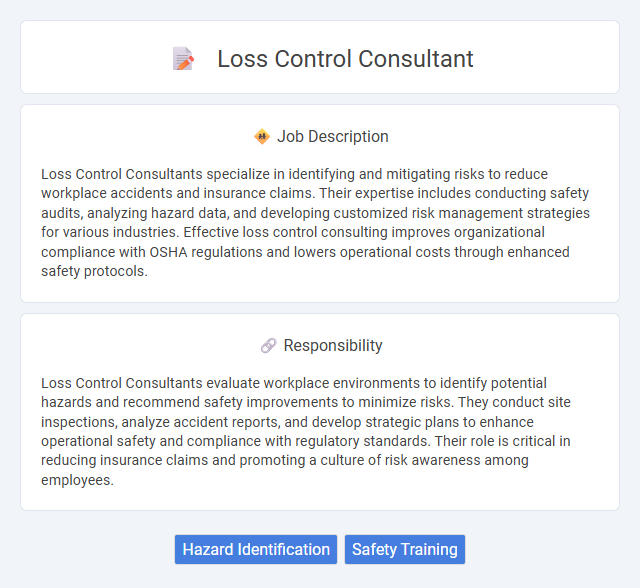
Loss Control Consultants specialize in identifying and mitigating risks to reduce workplace accidents and insurance claims. Their expertise includes conducting safety audits, analyzing hazard data, and developing customized risk management strategies for various industries. Effective loss control consulting improves organizational compliance with OSHA regulations and lowers operational costs through enhanced safety protocols.
Individuals with strong analytical skills and attention to detail are likely well-suited for a Loss Control Consultant role, given the need to assess risks and implement preventative measures. Those comfortable working in dynamic environments and communicating recommendations effectively may find this position fitting their strengths. Conversely, people who prefer routine tasks or lack expertise in safety protocols might struggle to excel in this job.
Qualification
A Loss Control Consultant typically requires a bachelor's degree in safety management, engineering, or a related field, combined with certifications such as Certified Safety Professional (CSP) or Associate in Risk Management (ARM). Proven experience in risk assessment, safety program development, and regulatory compliance is essential for effective loss prevention strategies. Strong analytical skills and knowledge of OSHA standards and industry-specific regulations enhance a consultant's ability to minimize workplace hazards and reduce insurance claims.
Responsibility
Loss Control Consultants evaluate workplace environments to identify potential hazards and recommend safety improvements to minimize risks. They conduct site inspections, analyze accident reports, and develop strategic plans to enhance operational safety and compliance with regulatory standards. Their role is critical in reducing insurance claims and promoting a culture of risk awareness among employees.
Benefit
A Loss Control Consultant likely helps businesses identify and mitigate risks, which can significantly reduce insurance costs and workplace accidents. Their expertise probably leads to improved safety protocols, enhancing employee well-being and operational efficiency. Companies employing their services may see long-term financial savings and a stronger safety culture.
Challenge
The role of a Loss Control Consultant likely involves navigating complex risk assessments and developing tailored strategies to minimize potential hazards across various industries. Challenges may stem from staying updated with constantly evolving safety regulations and effectively communicating best practices to diverse client groups. Successfully addressing these obstacles probably requires a combination of technical expertise, analytical skills, and strong interpersonal abilities.
Career Advancement
Loss Control Consultants play a critical role in risk management by assessing workplace hazards and implementing safety protocols to minimize financial losses for organizations. Career advancement opportunities in this field often include progressing to senior consultant positions, risk manager roles, or insurance underwriting leadership, supported by certifications such as Certified Safety Professional (CSP) and Associate in Risk Management (ARM). Continuous development in data analysis, regulatory compliance, and industry-specific knowledge enhances prospects for leadership and specialized consulting careers within various sectors.
Key Terms
Hazard Identification
A Loss Control Consultant specializes in hazard identification by conducting thorough site inspections and risk assessments to detect potential safety threats. They analyze workplace environments using industry standards and regulatory guidelines to recommend effective control measures. Their expertise in hazard identification helps reduce accidents, minimize insurance claims, and improve overall organizational safety performance.
Safety Training
Loss Control Consultants specialize in conducting comprehensive safety training programs to minimize workplace hazards and ensure regulatory compliance. They analyze risk factors and develop tailored safety protocols to prevent accidents, reduce insurance claims, and improve overall organizational safety culture. Expertise in OSHA standards, hazard communication, and emergency response training is critical for effective loss prevention.
 kuljobs.com
kuljobs.com